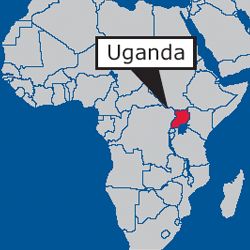Article 19 believes that the seriousness of the current situation requires the East African Legislative Assembly to immediately convene a special session to address attacks on journalists, human rights defenders and the media in the country.
The East African Legislative Assembly (Assembly) is an organ of the East African Community, being the Legislative arm of the Community. Members are sworn in to five-year terms. Assembly presents nine elected members from each country and seven ex-officio members. The East African Community is an intergovernmental organisation comprising the five east African countries Burundi, Kenya, Rwanda, Tanzania, and Uganda.
Brutal attacks
During May 2011 alone, at least nine people have died in Uganda follo wing brutal attacks by state security agents, and many more were injured, including journalists.
wing brutal attacks by state security agents, and many more were injured, including journalists.
“While it is laudable that the East African Community is in the last stages of developing a Framework on Governance and a Bill of Rights, it is critical that member states hasten their adoption, in order to provide the secretariat and other EAC agencies with necessary tools to safeguard fundamental freedoms in the region” says Dr Agnes Callamard, Article 19 Executive Director.
“Current attacks on the media and activists cannot be tolerated, and there must be no impunity for the perpetrators of these attacks,” continued Dr Callamard.
Similarly, the new EAC Secretary General should sanction the EAC secretariat to convene a meeting of all National Human Rights Institutions in the five member states in order to hold a hearing on the issue of violations committed during the walk-to-work protests.
Furthermore, the EAC and African Commission on Human and People’s Rights, according to Article 19, must impose pressure and other measures on Uganda to initiate independent and effective investigations into the ongoing large scale violations of rights, including the right to life and right to freedom of expression.
Article 19 urges the Ugandan authorities to provide a standing invitation to the UN and the African Commission on Human and People’s Rights Special Rapporteurs on freedom of opinion and expression and freedom of assembly, to conduct visits and issue reports on the state of freedom of expression and freedom of assembly in the country.
Journalists under attack
Journalists’ cameras and notebooks were confiscated by security agents as they sought to recently stop peaceful demonstrations in Uganda.
An estimated 20 journalists and bloggers are on bail facing different criminal charges and risk attending to their charges while in jail if the recent proposal by the president to amend the constitution to ensure that journalists and other suspects thought to be enemies of the state do not receive bail for six months after arrest.
On 24 May police raided the offices of a local newspaper; Ggwanga, and arrested four employees allegedly for filming the police and military while brutally breaking a peaceful demonstration and President Yoweri Museveni publicly singled out Al-Jazeera, the BBC, NTV and the Daily Monitor as the “the enemies of Uganda’s recovery” for their consistent coverage of State atrocities.
Article 19 has over the past years been concerned about the deteriorating freedom of expression situation in Uganda including attacks on the media.
Tensions continue since February 2011
Tensions have risen in Uganda since the February 2011 presidential elections, where several opposition parties have organized and staged walk-to-work campaigns, protesting rising fuel prices. Meanwhile, incumbent president Museveni has faced mounting criticism from opposition parties for altering the constitution to allow him to run beyond two elected terms.
The Kampala Magistrate Court has charged the editor of online newspaper The Uganda Record with criminal libel against President Yoweri Museveni over two articles published in July last year, according to local journalists. The two opinion articles printed on July 12 and 16 speculated whether the Ugandan government was involved in the July 11, 2010 bomb attacks in Kampala.
Criminal libel and, previously, sedition charges have been routinely used to silence Uganda’s critical press. At least 13 journalists have faced criminal libel charges in the past five years, according to CPJ research. In the majority of these cases, the journalists were acquitted.
Read more about authorities’ action against journalists in Uganda here and here.
Related articles:





